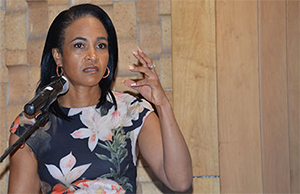News & Media
Internal auditors must have a ‘beyond business acumen’
“It’s impossible to predict every situation, but when something does happen are we ready to move?” Posing this important question was Dr Claudelle von Eck, CEO of the Institute of Internal Auditors of South Africa, at a Unisa Risk Management Seminar on 8 September 2016.

Dr Claudelle von Eck (CEO of the Institute of Internal Auditors of South Africa) was speaking at a Unisa Risk Management Seminar on 8 September 2016. She believes it’s time for internal auditors to reinvent themselves and the profession. “Internal auditors must have a ‘beyond business acumen’. They need to be fluid dreamers who can re-imagine and move into a higher order of thinking,” she said.
Von Eck, who is a Unisa alumna as well as the former President of the Unisa Convocation and a Council member, had the challenge of discussing whether internal audit is a hindrance or enabler. No doubt opinion is divided on this.
Fluid dreamers who can re-imagine
With the evolution of technology and other factors, it seems that the corporate accounting profession is having second thoughts about the use, or even value, of internal auditing. All is not lost though and Von Eck believes it’s time for internal auditors to reinvent themselves and the profession. “Internal auditors must have a ‘beyond business acumen’. They need to be fluid dreamers who can re-imagine and move into a higher order of thinking,” she said. She pointed out that internal auditing initiates change, so there is an expectation for internal auditors to understand the landscape and the players. “They need to understand the organisation like the palm of their hand and it’s important that they play a role in the strategic and operational space too.”
When it comes to enabling intelligent risk taking, Von Eck said internal auditors need to start questioning if there are enough controls in place, or if there are indeed too many. “We also need to question whether risk warrants controls in place or if we are adding unnecessary brakes,” she said. “While we are doing all this, it’s imperative that we also look into the reduction of costly bureaucratic processes, challenge management’s appetite for risk, and encourage an adaptive strategy—have we got enough nimbleness built into it,” she queried.
The Vice-Chancellor genuinely believes that effective risk management has a huge role to play in the higher education space. “Effective risk management can do much to protect universities, ensure the integrity of the academic project and support sustainability, and, dare I say, prosperity, if core risks are correctly identified and mitigated.”
Risk management not a burden but a benefit
Prof Mandla Makhanya, Principal and Vice-Chancellor of Unisa, is pleased that the university has created a platform like this, which looks at the practical implementation of issues of risk management (both externally and internally), foregrounding best practice in risk management, the crucial role of risk identification, with the concomitant opportunities that can be derived from proper risk awareness. “As you will hear, Unisans are all being educated to become risk ambassadors and risk champions, understanding that risk management is not a burden but a benefit. Good governance is an integral component of Unisa’s Leading Change imperative for the next five years, aligned to our motto of define tomorrow. We, like all South Africans, are aware of the scourges of fraud, corruption, unethical practice, and crime and we acknowledge the crucial role of the university sector in addressing and redressing these plagues,” he said.
Publish date: 2016/10/17

 Unisa co-hosts G20 community outreach in the Eastern Cape
Unisa co-hosts G20 community outreach in the Eastern Cape
 Unisans gain membership of prestigious science academies
Unisans gain membership of prestigious science academies
 Advocating for disability transformation through servant leadership
Advocating for disability transformation through servant leadership
 Unisa Press continues to illuminate the publishing space
Unisa Press continues to illuminate the publishing space